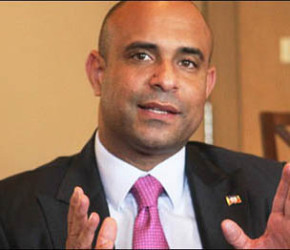BOGOTA, (Thomson Reuters Foundation) – Haitians have been sidelined from reconstruction efforts following the earthquake that rocked Haiti six years ago, and a new approach is needed to give them more say in how billions of dollars of aid are spent, a Haitian former prime minister said.

Laurent Lamothe, prime minister from May 2012 to December 2014, questioned the effectiveness of foreign aid as Haiti is still struggling to recover from the Jan. 12, 2010 quake that killed 200,000 and flattened the capital Port-au-Prince.
Some aid groups have said corruption and weak governance by Haitian authorities are behind their reluctance to channel aid through the government, but Lamothe believes this attitude has damaged the recovery of the western hemisphere’s poorest state.
“The problem with aid is that it wasn’t country led and it wasn’t country owned,” he told the Thomson Reuters Foundation in a recent telephone interview.
“It has been very damaging for Haiti. It’s created basically a situation where there was no transfer of knowledge, no jobs were created,” said Lamothe, whose tenure was the longest of any Haitian prime minister in the last three decades.
Most of the aid from the United States, the largest foreign donor, is still bypassing local companies, according to the Washington-based Center for Economic and Policy Research (CEPR).
The think-tank, a critic of U.S. foreign policy in Haiti, says the U.S. Agency for International Development (USAID) has awarded around $1.8 billion in contracts since the quake, of which only 1.6 percent hase gone directly to Haitian companies.
“Certainly most of the aid money continues to go to the same partners as always,” said Jake Johnston, a CEPR research associate, referring to U.S.-based Chemonics International Inc., among others. “Though some small efforts to increase funds going to local organisations have begun, with limited success.”
“It’s not all the international community’s fault,” said Lamothe, also a former businessman and foreign minister. “The gridlock in Haitian politics has created a space of mistrust. Haitian politicians have to get their act together so that aid is channelled through them.”
The latest index of anti-corruption watchdog Transparency Internation-al, which ranks 175 countries by their perceived levels of public sector corruption, ranks Haiti at 161, among the 15 most corrupt.
Lamothe said concerns over corruption “can’t be an excuse not to give aid” to Haitian authorities and local non-governmental organisations, adding that there are ways of controlling how aid is spent, such as international audits.
“It’s a question of trust and credibility,” he said.
POLITICAL CRISIS
An independent electoral commission said the first round of voting in Haiti’s presidential elections in October was marred by fraud, and delays in holding a runoff vote had caused political instability and undermined reconstruction efforts.
Haiti’s electoral council announced last week the runoff vote between ruling party candidate Jovenel Moise and opposition challenger Jude Celestin would take place on Jan. 24, though Celestin says he will boycott the vote because he has no faith in the process.




